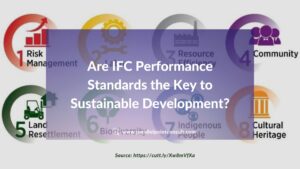The IFC Performance Standards: Driving Sustainable Development

The International Finance Corporation (IFC), a member of the World Bank Group, has established a set of Performance Standards that outline environmental and social requirements for projects it finances. These standards serve as a benchmark for sustainable development, guiding businesses and organizations in managing potential risks and impacts associated with their operations. The application of IFC Performance Standards is crucial in promoting responsible business practices, ensuring environmental protection, and safeguarding the well-being of communities affected by development projects.
The IFC Performance Standards, comprising eight robust benchmarks, delineate the requirements for sustainable project development that cover a range of environmental and social considerations, including biodiversity conservation, community health and safety, labour rights, and stakeholder engagement. By adhering to these standards, companies can mitigate risks, enhance project sustainability, and contribute to positive development outcomes. The application of IFC Performance Standards is not only a requirement for projects financed by the IFC but also a best practice for organizations committed to responsible and sustainable business conduct.
Numerous projects around the world have demonstrated the successful application of IFC Performance Standards in diverse sectors such as renewable energy, infrastructure development, and agribusiness. Consider a solar energy venture in Africa, which implements stringent environmental and social management practices in line with IFC Performance Standards, leading to minimal environmental impact and positive community engagement. Similarly, an infrastructure project in Asia vital for driving economic growth and enhancing societal well-being, is undergoing a paradigm shift towards sustainability. The project prioritized worker safety, community consultation, and biodiversity conservation, showcasing the practical application of IFC standards in real-world projects.
In today’s interconnected global economy, supply chains wield significant influence over social and environmental outcomes. Multinational corporations are increasingly leveraging IFC Performance Standards to instil ethical labour practices, human rights protection, and environmental responsibility throughout their supply networks. By holding suppliers to stringent sustainability criteria, these companies drive transparency, accountability, and resilience across the value chain.
While the application of IFC Performance Standards offers significant benefits in terms of risk management, sustainability, and stakeholder engagement, it also presents challenges for businesses and organisations. Compliance with the standards requires dedicated resources, expertise, and monitoring mechanisms to ensure effective implementation. However, by overcoming these challenges, organisations can unlock opportunities for innovation, reputation enhancement, and access to international markets that prioritize sustainability and responsible business practices.
As the global focus on sustainability and responsible business practices continues to grow, the application of IFC Performance Standards will play a crucial role in shaping the future of sustainable development. By integrating these standards into project planning, implementation, and monitoring processes, businesses can demonstrate their commitment to environmental and social responsibility, build trust with stakeholders, as well as contribute to positive development outcomes. The application of IFC Performance Standards is not only a strategic imperative but also a moral obligation to promote sustainable development, protect the environment, and uphold human rights.
Ultimately, by adhering to these standards, businesses and organisations can mitigate risks, enhance project sustainability, and contribute to positive development outcomes. As the global economy continues to evolve, the application of IFC Performance Standards will be instrumental in shaping a more sustainable, inclusive, and resilient future for all.
